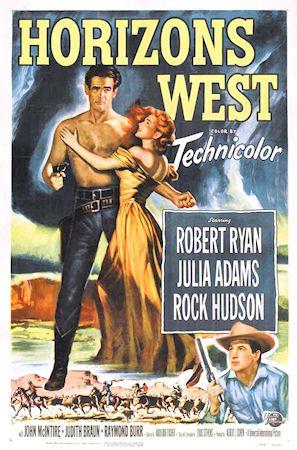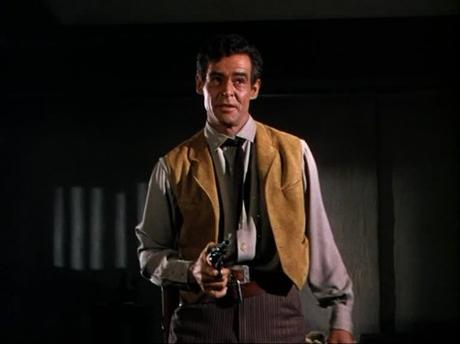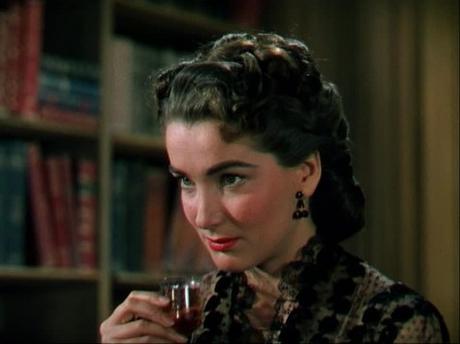
There are movies which look like they have everything going for them: a director with a substantial and significant reputation, a strong cast, and a promising script that is a blend of a couple of classic themes. All of this applies to Budd Boetticher's Horizons West (1952) - add in the fact that the film was one of those handsomely shot Universal-International productions and one might reasonably expect it to be a cast iron winner. However, the fact is it doesn't quite live up to the build-up. It's not a poor movie at all, just one which delivers a bit less than it could have - too much melodrama when more honest drama would have been preferable, and a series of conflicts which might have been more fully exploited.
The end of a war ought to signal a more peaceful era and maybe even a more hopeful one too. For the Hammond brothers, returning to their native Texas after taking part in the war between the states, the hopes are present although while Neil (Rock Hudson) wants nothing more than a return to the idyll he left behind when he signed on older brother Dan (Robert Ryan) is disgruntled enough to be in the mood for a different kind of struggle. By his own admission, Dan Hammond doesn't like losing and almost immediately sets about changing the course of his fortune. This period of reconstruction in the vanquished South is one which can make men rich fast and, as always, draw the consequent attention of beautiful women. It just so happens that the allure of wealth and a woman crosses his path as soon as he enters Austin, and it also happens that both in this case belong to one man, Cord Hardin (Raymond Burr). It shouldn't be any surprise that Dan will fall foul of this brash Yankee, nor that the clash is to set him on a path that tantalizes him with the promise of fulfilling his dreams but also creates a rift that threatens to irrevocably sour relations with his father (John McIntire) and Neil.

The title of the film - Horizons West - is both romantic and simple. Those two words pretty much encapsulate the spirit of the genre and I guess it's no wonder that Jim Kitses used this as the title of his examination of the most influential figures in the western, a book I highly recommend to anyone who hasn't yet read it. Yes, those two words conjure up all kinds of iconic imagery and it's therefore difficult not to have heightened expectations. As I said above, this isn't a bad little movie but everything from the title on down holds out the prospect of something greater and grander. Perhaps that's a tad unfair as I have a hunch that were one to come to it after the credits had rolled, and unburdened by any great familiarity with director or stars, then it would prove a satisfactory and satisfying way to pass 80 minutes or so. I sometimes feel that approaching movies as "film buffs" means that all that associated baggage we bring along is simply adding an unnecessary degree of pressure to how we perceive films and assess their relative worth.
Director Budd Boetticher's fame and reputation come principally from the films he made in the late fifties with Randolph Scott, what we refer to as the Ranown cycle. The greatness of those half-dozen westerns, a little interrelated cluster of bona fide masterpieces - cannot be disputed; they mark the director and his star out as giants of the genre. However, the flip side is the way the towering reputation of those films tends to cast a deep shadow over the rest of Boetticher's body of work. That his other, earlier movies do not attain those artistic levels shouldn't be regarded as any particularly damning criticism. Generally, Boetticher had far less creative control over the films he was making as a contract director within the studio system, a fact which applied to almost all filmmakers. Boetticher, like any contract director, was employed to turn in a competently made product as efficiently as possible. This is what he did on titles such as Horizons West, the script of which lays the melodrama on thicker than it needed to and only scratches the surface of the theme of sibling rivalry and the differing perceptions of ambition within a family. The film always looks sumptuous (as Universal-International productions typically did) even if the on screen action is a little lacking at times. As usual, Boetticher shines brightest in the outdoor scenes and the action sequences, the final act being especially well-handled.

I've spent plenty of time singing the praises of Robert Ryan on this site before, and I'll try to confine myself to pointing out the fact he rarely gave a disappointing performance and certainly didn't do so in this instance. His edgy magnetism once again anchors the movie and he uses the duality of his character to great effect - I often think it was impossible for Ryan to play anything other than an interesting role. In terms of the development of the story, I would have liked to have seen more of the growing chasm between the two brothers. However, Rock Hudson was still in the early stages of his career and thus his part was limited somewhat - although each successive film would see his screen time expanded. Julie Adams was handed a good vampish role as the wayward wife of the northern carpetbagger and she makes for a very attractive presence. Raymond Burr was well on his way towards becoming virtually typecast as unsympathetic villains in these pre Perry Mason years - he played such parts very convincingly but he must surely have been bored by the dearth of variety at the same time. One of the delights of these studio vehicles was the richness of the supporting casts, and Horizons West certainly doesn't disappoint on that score - John McIntire, Dennis Weaver, James Arness, Douglas Fowley, Tom Powers, Rodolfo Acosta and Walter Reed all add value to the viewing experience.
Some years ago, the only available copy of Horizons West was the German DVD by Koch Media, which I have. Since then, however, the movie has been released in the UK and the US, and probably in other territories as well. I can only comment on the Koch disc, which displays some genuinely eye-popping colors and is extremely sharp on occasion. There are some instances of softness though, and also some minor registration issues where the color can appear to bleed slightly. Overall though, I have to say the film looks very fine. So, to sum up, we're talking here about a solid movie featuring the talents of Boetticher and Ryan. Even if it has imperfections and isn't up there with the very best work such people were capable of, it remains entertaining and worthwhile.
